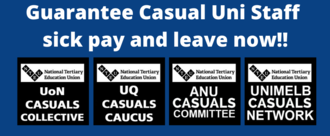- Featured
- Asylum Seekers and Migrants
- Climate and Environmental Justice
- Disability Justice
- Economic Justice
- Education
- First Nations Justice
- Health and Medicare
- International Solidarity
- LGBTIQA+ Rights
- Media and Arts
- Occupational Health and Safety
- Public Services
- Public Transport
- Racial Justice
- Social Justice
- Women's Rights
- Workers' Rights
- More
-
Home care & disability workers need paid leave & protective gear to stop the spread of COVID-19!The lives of thousands of Australians hinge on our government taking immediate action by guaranteeing paid leave and protective equipment for all home care & disability support workers.477 of 500 SignaturesCreated by United Workers Union
-
Help Aged Pensioners shop in PeaceThere is Lots of Panic Buying in our Supermarkets at this time of need. Lots of people are scared about COVID-19 Virus, i feel our Elderly are being left behind when trying to shop for their everyday items. If all Supermarkets were open one hour earlier on this Pension Day 19-03-2020 our Elderly could shop in Peace, and be able to secure their Everyday Items before the panic Buyers Entered the store. It would a safe haven for our Elderly who are most Vulnerable to the COVID-19 Virus.6 of 100 SignaturesCreated by Pete OBrien
-
Clean Schools: Keep your kids safeSchool cleaners don’t have enough time to do their job because of cuts to cleaning hours by the NSW Government. Cleaners want to ensure your kids are safe but simply don’t have enough time to do the job they want to do.1,202 of 2,000 SignaturesCreated by United Workers Union
-
COVID-19: Two weeks paid leave for casual workers affected by CoronavirusWe are saying with one big loud voice: it’s time for the Federal Government to step up and support casual workers and the businesses that employ them. Everyone besides this government understands that casual workers cannot afford to go into quarantine for two weeks without pay. Nor can these workers afford to go on Newstart which is just $40 a day and below the poverty line. And many workers aren’t even eligible. No one wants casual workers going to work who are sick simply because they can't afford to lose pay. Lots of businesses are doing the right thing and supporting their staff. But many small businesses are already on their knees from the bushfires and they face another massive blow from the Coronavirus. Now is the time for real leadership. We need this government to step in and ensure all workers forced to take leave because of Coronavirus can do so, and not be left out of pocket.13,600 of 15,000 SignaturesCreated by Hospo Voice Members
-
Guarantee casual uni staff sick pay and leave!The possibility of university-wide shutdowns in response to the COVID-19 virus is a terrifying one for casual and insecure workers who have no sick pay or leave entitlements. In Australian public universities, more than half of all teaching at our universities is delivered by casual staff, we are not marginal we are the backbone of the sector. This means that in the event of a shutdown, thousands of university staff are facing the loss of income they rely on to pay the bills and keep food on the table or even job losses. Casual workers who become sick in the coming weeks and months will have to decide whether they can afford to self-isolate or quarantine. This is both unconscionable and dangerous. The responsibility for this disastrous situation lies squarely on the shoulders of university managements who have responded to declining public funding by building an insecure workforce – all while enjoying some of the highest salaries in the world for university executives. So far, only Macquarie University has guaranteed access to sick pay and leave for casual staff in the event of self-isolation or shutdown. This is a welcome decision and we call on all other universities to follow their example. Currently, universities remain open for business, but the COVID-19 travel bans and public health crisis have given spendthrift universities across Australia an excuse to cut jobs. Frontline teaching staff have already lost work and more job losses are threatened. At the same time, staff workloads have intensified as student support needs have escalated. Despite the number of unknowns facing Australian universities, one thing is certain: domestic and international students will need more support – not less – because of the disruption caused by COVID-19. A well-staffed university workforce is fundamental if we are to meet the needs of students during this public health crisis. Casual staff must not pay the price for the COVID-19 outbreak. We are not a ‘soft expense’ to be cut when convenient, nor should we have to choose between our health, the health of our students and colleagues, and putting food on the table. By March 18 all universities must guarantee: · Casual staff continue to be paid if they are required to self-isolate. This is a basic requirement to secure the welfare of casual staff and ensure the safety of the university community. · Casual staff continue to be paid in the event of university shutdowns, even if they are unable to work from home. Casual staff perform work in teaching and research that is core to the mission of universities. Retention and support of casual staff must be a university priority. · Stop job cuts and austerity measures. Universities need more – not less – frontline staff to support and retain students through this difficult time. Endorsed by: NTEU UniMelb Casuals Network, NTEU ANU Casuals Committee, NTEU UoN Casuals Collective, NTEU UQ Casuals Caucus2,838 of 3,000 SignaturesCreated by NTEU UniMelb, ANU, UoN & UQ Casuals

-
Coronavirus: Guarantee Paid Special Leave For All WorkersAs Australians, we stick together with our mates – we don’t leave people behind. But there are 3.3 million Australian workers with no access to paid leave – this represents 32% of all working people. If these workers become ill they will either attend work sick or potentially be subject to self-isolation quarantine at home without means to pay their bills. We can't wait - people are already being forced to go into quarantine and losing income. Many workers are also being forced to use their leave and some are even being stood down without pay. We are demanding that the Morrison Government guarantee two weeks paid special leave for all workers. Sign this petition to demand access to two weeks paid special leave for all workers affected by Coronavirus (COVID-19).116,118 of 150,000 SignaturesCreated by Australian Unions
-
Online Teaching in UTAS under COVID-19 ThreatTo whom may concern, We are a group of students who wish to contribute efforts to stop COVID-19 from the total outbreak in Tasmania. On 7th March 2020, Public Health Services has been notified of a confirmed case of coronavirus in Hobart. This brings the total number of confirmed cases in TAS to 2. This is a known fact that the coronavirus is a highly contagious epidemic disease that causes 64 confirmed cases and 2 death. However, people have not paid sufficient attention to prevent the transmission of the virus. To protect people's health in UTAS, we should avoid gatherings to guarantee that the virus will not spread from person to person. If you also want permission to study online, please sign in this petition. Thank you!216 of 300 SignaturesCreated by Shuo Shan
-
Calling for a vote of no confidence in the Morrison government.I created the petition based on the myriad of scandals the Morrison government is embroiled in. The prime minister isn’t honestly dealing with allegations of corruption and rorting. He isn’t taking climate action seriously and the political/financial interference of the fossil fuel industry is likely behind that. He’s hell bent on rolling out of the Indue card despite evidence of how it disadvantages the most vulnerable people. And there’s an overall lack of accountability, transparency and integrity. Where is a Federal ICAC? The list goes on. I could also include the unwillingness to implement recommendations from Royal Commissions, the poor response to the bushfire crisis, and the rise of right wing extremism, and claiming a surplus from the NDIS underspend while splashing money around dodgy contracts with Indue, Paladin and others with links to the LNP. I truly believe that if enough ordinary people stand up we can let politicians know that democracy belongs to us and not to them. They should serve the public good and not just be in it for themselves, and the power that comes with their elected positions. When they make bad decisions, they need to take responsibility and be answerable to us. I’m sure there’s enough of us who want to give the prime minister the message: Scotty from marketing - we’re not buying what you’re selling.1,355 of 2,000 SignaturesCreated by Margaret Sinclair
-
Mater, Don't Cut Pharmacist PayPharmacists are taking industrial action to fight off these draconian cuts. We're asking for your support so we can show Mater that the community values the care provided by pharmacists, and that it's not ok to cut pay.381 of 400 SignaturesCreated by Gianni Sottile
-
Stop leaving NDIS clients out in the cold! Disabled clients and their care workers deserve dignityMy name is Jane, and my client Kim is one of thousands of NDIS clients who received the letter telling them their services with Australian Unity will be cut. I’ve been working with Kim for fifteen years, and I’ve never seen her this stressed. She chose to challenge Australian Unity’s decision on the basis that the changes would put her health and safety at risk, but now she’s on the verge of having her care discontinued, with no adequate replacement services in place. All Kim wants is to maintain quality care from her care workers she has had long lasting relationships with. She’s tried everything she can think of, and now she’s scared. As a former health professional, she knows her condition would be far worse, if it wasn’t for the well trained care workers she receives her daily care from.1,306 of 2,000 SignaturesCreated by Jane, care worker
-
Fund MATES in ConsructionOn average 190 Australians working in the construction industry die by suicide each year, that's one death by suicide in this industry sector every second day. Males in the construction industry are twice as likely to commit suicide than males in any other industry and are six times more likely to die of suicide than a workplace accident. This is totally unacceptable, and worse still, the industry organisation doing something about it has been defunded and hampered in its efforts to change the situation. We call on our elected representatives in the South Australian parliament to vote to stand by our MATES and properly fund MATES in Construction SA.159 of 200 SignaturesCreated by John Adley

-
Keep hospital car parking affordable!This is an unacceptable financial burden to impose on hospital workers – many of whom are already low paid and in insecure work. Hospital workers are part of a 24-hour, seven-day workforce that cannot rely on public transport. A cleaner who works 25 hours per week in a major metropolitan hospital currently pays $561.34 per year in parking. Now they will be expected to pay an additional $725 per year whilst only taking home $663.25 per week in wages. These costs are untenable for the workers providing essential services in our hospitals. The general public can also expect to pay 20% more to attend a metropolitan hospital. Visiting a loved one in hospital is stressful enough, without needlessly adding financial barriers. Those that need to attend hospital regularly for treatment will also now have to bear increased costs when they are trying to recover. Charging hospital workers, the sick or injured and their families to attend a hospital in the name of Government revenue-raising is a disgrace.4,461 of 5,000 SignaturesCreated by United Workers Union SA






.png)





.jpg)
